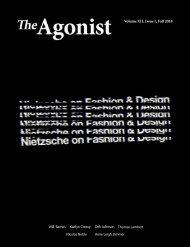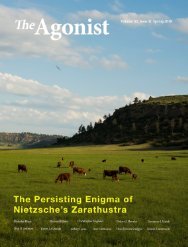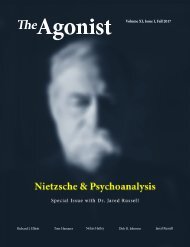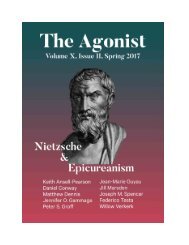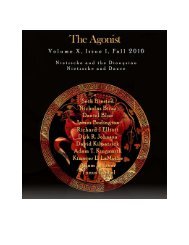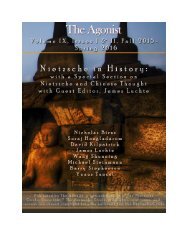Volume XII, Issue II, Spring 2019
You also want an ePaper? Increase the reach of your titles
YUMPU automatically turns print PDFs into web optimized ePapers that Google loves.
THE AGONIST<br />
The Gay Science is especially important as it juxtaposes the preservation of the<br />
species alongside Nietzsche’s foremost themes: the death of God and the eternal<br />
return. Vanquishing the resilient shadows of God requires overcoming the death<br />
of mankind. The madman announces the murder of God in the marketplace,<br />
accusing this thought, the great dangerous and mad contemplation of the future<br />
fate of the species, of being the culprit. “All of us are his murderers. But how did<br />
we do this? How could we drink up the sea? Who gave us the sponge to wipe<br />
away the entire horizon? What were we doing when we unchained this earth for<br />
its sun?” (181). Note the difference and repetition: the sea which marks the limits<br />
of the horizon has now been transcended. For those brave birds there is no longer<br />
any land, only open-ended sea, outside of the sun’s orbit, an irreversible plotting<br />
towards infinity. “Whither are we moving? Away from all suns? Are we not<br />
plunging continually? Backward, sideward, forward, in all directions? Is there still<br />
any up or down? Are we not straying as through an infinite nothing?” (ibid).<br />
Humanity is unmoored, detached from gravity, no longer caught in orbit, lost<br />
adrift.<br />
Nietzsche asks a rhetorical question that many have interpreted as a<br />
theoretical naturalism (Schacht). “When may we begin to ‘naturalize’ humanity in<br />
terms of a pure, newly discovered, newly redeemed nature?” (169). Nietzsche’s<br />
naturalism is neither scientific nor methodological (Leiter). Nature is the<br />
descriptive terrain in which humans emerge and life is understood. Humanity is<br />
natural all too natural, being the product of nature and determined by natural<br />
processes, but nevertheless is distinct from nature. Humanity and nature are<br />
unalike by how each are constituted by temporality. Humanity is finite whereas<br />
nature is infinite. Nietzsche offers several warnings to faithful adherents of his<br />
philosophical naturalism. “Let us beware of saying that death is opposed to life”<br />
(168-169). The demise of the human species neither squanders nor vindicates our<br />
mendacious minute in the sun. “Let us beware of thinking that the world eternally<br />
creates new things. There are no eternally enduring substances” (169). Nothing<br />
lasts, humans most especially. Likewise, the promise of transhumanism is a false<br />
comfort. The world is not alive, nor is it a machine. Do not ascribe cyclical<br />
movements to a world that is actually chaotic. Nature is neither cruel, nor lawlike.<br />
Contrast two rival descriptions of chaos. For the Greeks, chaos represented<br />
the void, the original nothingness that predated the Titans. That there is<br />
something rather than nothing is just as conceivable as it opposite, an eternal<br />
omnipresent nothingness. But there is also the chaos of theoretical physics which<br />
ascribes a process of randomness to nature. Is the randomness of the dice-throw<br />
and the monstrous void mutually exclusive? A commitment to chance admits that<br />
nothingness is an outcome amongst many. Humans might die out, or they might<br />
14



